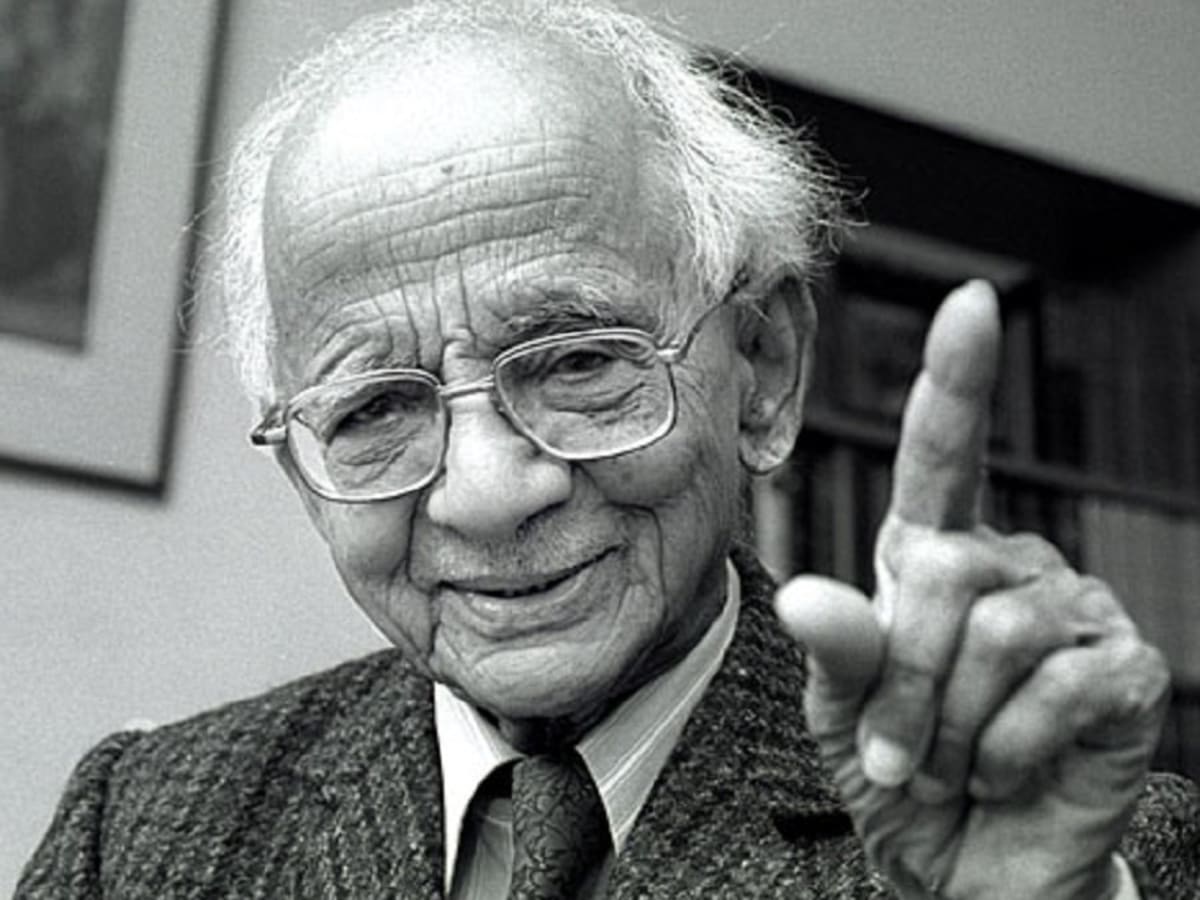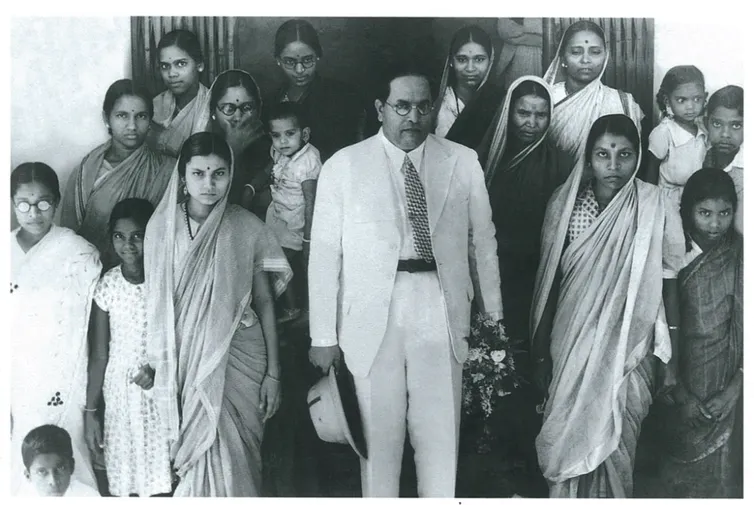- Visitor:28
- Published on:
When an Indian Met the ‘Intimate Enemy’: Nirad Chandra Chaudhuri’s Life and Work – 2
Should one place Nirad.C. Chaudhuri in the “Bengal renaissance” of the late nineteenth and early twentieth century? Read the second part of this wonderful series on one of India’s most popular writers of the modern era.

Contextualizing Nirad Chandra Chaudhuri
Mostly, the nineteenth century Bengali intelligentsia grappled with the colonial reality to arrive at nationalism and a collective sense of self-worth as a society and culture. But there were also elements among them who surrendered to the ‘intimate enemy’. They embodied the subjectivity of capitulation. It is best exemplified by the poet Michael Madhusudan Dutt (1824-1873).
Dutt, like Bhudev, had attended Hindu College. The two, in fact, were contemporaries there and shared a close friendship.[1] They were, of course, vastly different personalities. Unlike Bhudev, Dutt was a ‘radical’ who constantly defied tradition. He consumed alcohol[2] and was probably ‘open minded’ regarding beef.[3] The young Dutt was also a passionate Anglophile. A poem he wrote in 1841, as a lad of seventeen, contained the following line –
“And, oh! I sigh for Albion’s stand
As if she were my native land.”[4]
In case the reader is not aware, ‘Albion’ is another name for Britain. Already as a teenager, Dutt was pining for that country like it was his own. He embraced Christianity in 1843, prefixing ‘Michael’ to his name. To commemorate the occasion, Dutt had composed a hymn. Golam Murshid, author of Dutt’s biography in Bengali (Āśār Chalané Bhūlī[‘Misled by Hope’]), writes that it was solemnly rendered as he was baptized. The first stanza of this testament of a newly acquired faith went as follows –
“Long sunk in superstition’s night,
By sin and Satan driven, –
I saw not, cared not for the light
That leads the blind to heaven.”[5]
Dutt had trenchantly scorned the dharma of his forebears. He had termed Hinduism superstitious darkness motivated by ‘sin and Satan’; it had kept him from the light, presumably Christianity, that took even the blind to heaven. Dutt wanted the Anglo-Saxon rulers of India “to renovate, to regenerate, to civilize, or in one word, to Christianize the Hindu!”[6] He saw his colonial overlords as the potential providers of spiritual deliverance to his former, benighted, co-religionists.
For several years, Dutt pursued success and fame as a poet and dramatist in the English language and very thoroughly became an ersatz European. The pursuit was unsuccessful. His English verse failed to earn him any encomiums. For instance, the educator Drinkwater Bethune found Dutt’s long narrative poem, The Captive Lady, quite underwhelming. Mr. Bethune wrote to Dutt’s close friend Gaurdas Basak that his time would be more profitably utilized if he did not expend it writing English poetry.[7] Dutt eventually switched to writing in Bengali and produced his poetic magnum opus Meghnādbadh Kābya (1861). Its theme was derived from the Ramayana. This epic poem related the slaying of Maghnad, Ravana’s son, by Lakshmana. Dutt, however, upturned the Ramayana as he depicted Ravana and Meghnad as “majestic, masculine, modern heroes” and Rama and Lakshmana as “weak-kneed, passive-aggressive, feminine villains.”[8] Dutt, writes Ashis Nandy in The Intimate Enemy, endorsed the “demonic masculinity” of the rākṣasas.[9] Why did he do so? According to Ashis Nandy, Dutt sought to contain within the “Indian world view the Western concepts of the male and the female” and for him Ravana and the rākṣasas represented the “heroic qualities of…true, adult masculinity.”[10] Simply put, Dutt was tailoring Indian tradition to reflect the western ideals of the masculine and feminine. And Ravana and his acolytes appealed to him since they seemed to represent the former.
Dutt’s subjectivity was one of a complete capitulation to the ‘intimate enemy’ that was colonialism. He pined for Britain as though he belonged there. He gave up the dharma he was born into and wanted the British to spiritually deliver the Hindus. He even found it necessary to tamper with the Ramayana, an itihāsa revered by his compatriots, so that it confirmed to the western gender ideals. Dutt had profoundly internalized the western social notions of the ‘proper’.
Nirad C.’s subjectivity too was one of capitulation. He had, like Dutt, yielded to the ‘intimate enemy’. We have seen how he idealized England as a child, the great lengths he went to Europeanize himself, the admiration he professed for British rule, and the poor opinion he nurtured of Indian nationalism. Unlike Dutt, Nirad C. never renounced his ancestral faith and identified himself as a Hindu all life. However, it seems that this identification was burdened with considerable self-loathing. He, as we saw, termed the Hindus xenophobic. Nirad C. added further dimensions to this notion in The Continent of Circe. We see him writing that “the familiar words about the tolerance and capacity of synthesis of the Hindus” are not true since there are “deep suspicions and enmities among the human groups in India” along with “endemic outbursts of murderous ferocity….”[11] Nirad C. thought that Hindus are “incorrigible” in their militarism[12], in other words, violent, and their advocacy of non-violence is a “feckless emotion”[13], that is, insincere. As viewed by him, Hindus also possessed a “streak of insanity”[14] and had managed to survive despite that only since “nine-tenths” of them were “inert”[15]. Interestingly though, Nirad C. thought that the Hindus are debased Europeans. This was because he had completely assimilated the European ‘orientalist’ telling of Indian history. Hindus, thought Nirad C., are descended of Aryans whose original homeland “was somewhere between the Danube and the Volga.”[16] Moving eastwards over the centuries, they eventually arrived in Iran. Here some differences emerged in their midst “over a question of religion and beliefs.”[17] The bulk of them, Nirad C. imagined, “showed signs of creating an intolerant single God.”[18] As a consequence, the Aryans who were averse to this religious innovation “migrated to India with their gods….”[19] The contemporary Hindu, thus, was a “European distorted, corrupted, and made degenerate by the cruel torrid environment [of India]….”[20] As Nirad C. understood, every ill that plagued Hindus was a consequence of adjusting to the tropical climes of India. Let me also, at this point, explain the title ‘The Continent of Circe’ so that the full implications Nirad C.’s view of Hindus and India are borne out. In Homer’s Odyssey, Circe is a sorceress living on an island. She lures sailors and turns them into pigs. Thus, through his excursus of Hindus’ supposed nature and history, Nirad C. was making the following insinuations – that India is akin to Circe’s island on an enormous (‘continental’) scale, while the Hindus may be likened to her victims who suffered a porcine fate.
A Passage to England
The Continent of Circe is some frank obloquy that Nirad C. directed at his own society and country. A Passage to England, on the other hand, is sheer sentimental exaltation of the former metropole. Nirad C. finally got to visit the country of his childhood dreams as a middle-aged man in 1955 and was dutifully starstruck. In his own admission, he “had a more exciting and interesting time than in all the rest of his life”[21] over the five weeks he spent there. We might say that he reveled as he met the ‘intimate enemy’ or, rather, sojourned through the physical and cultural space that embodied it.
As a travelogue, there is a lot that A Passage to England touches upon. Nonetheless, it is best summed up as a set of responses. For the sake of brevity, let us say that Nirad C. responded to England at three levels while recounting his travels there – ‘ideal’, ‘sensory’, and ‘social’. By the first, that is, the ‘ideal’ response to England, I mean two things – firstly, Nirad C. matched the ‘idea’ of England that had built up in his mind over the years with what he saw; and, secondly, he ‘idealized’ this country as he went about exploring it. In the first of the two endeavors, he was not disappointed. Nirad C. had arrived with “ideas of England…acquired from literature, history, and geography.”[22] He thought that contemporary England “was very much like the England of history and perfectly consistent with it” and “noticed the continuity more than the break.”[23] Then, Nirad C. idealized the English terrain. He found the evidence of ‘man’s hand’ all over the English scenery, so much so that it seemed like “landscape gardening on a vast and countrywide scale….”[24] Yet, this scenery was “nothing quite artificial”, it merely suggested to him “the elimination of the dividing line between man’s work and Nature’s.”[25] To Nirad C., it appeared that ‘man’s’ and nature’s work coexisted and complemented each other in perfect harmony in England. English towns, he felt, “fit perfectly into their surroundings and…[gave] a point of dramatic human interest to the countryside.”[26] The individual country houses too did not “push back their surroundings”[27] but were “made to gradually merge into the landscape.”[28] In the end, he could not help but gush that “in actual fact, the English scene seemed much more romantic…than all the descriptions of it in poetry.”[29]
By Nirad C.’s ‘sensory’ response to England I mean the way he perceived the country optically. In other words, it is the description of how England registered on his visual sense. Nirad C. found the English sun feeble. To him it always “appeared like dawn there….”[30] Yet, as Nirad C. felt, this demure daylight augmented the English scene. It gave him a “a curious sense of the reality of the third dimension”[31] and an “impression of solidity”[32] to architecture. Further, this soft daylight made the colors more vivid to Nirad C.’s eyes. For instance, we see him declaring that in England he “saw floral colors almost as frozen masses, and for the first time understood the plastic function of color in painting.”[33] Another service that this light rendered to Nirad C. was to make the English landscape “decidedly more stereoscopic…than any visual reality [he] had been familiar with previously.”[34] While dwelling on the marvelous qualities of the English daylight, he grumbled that the sun was so strong in India that it deprived architecture of a sense of solidity. Barring the Taj Mahal at dawn, no “historic building in northern India”, Nirad C. thought, conveyed the “feeling of mass.”[35] He was thus led to the following ‘insight’ – “We see the world…in the East in one, a rarefied way, and they in the West in another, a concrete way.”[36]
Let us now briefly look at Nirad C.’s ‘social’ response to England. We find him observing diverse facets of English society and commenting on them. These comments are mostly in the form of commendations. Unsurprisingly, as he praised English society, he also, every now and then, berated his own. Nirad C. claims that he was soon able to “guess the station in life and class affiliations of a fair number of Englishmen….”[37] Yet, he thought that “they showed many more common traits than differences.”[38] He obviously took a roseate view of English society and (erroneously) assumed that its various strata did not differ in culture and mannerisms. Resorting to the analogy of a ship, he thought that English society was “all superstructure, all saloon, upper deck and bridge”[39] without a hull. We guess, he had formed the (once again, erroneous) conclusion that all English people had come to inhabit the same material and cultural level. To his eyes England appeared like a veritable utopia. For example, we find him writing in one of the later chapters that the English showed no excitement over politics since “they [had] ended social and economic injustice… [which had] deprived their politics of its most powerful motive force.”[40] Reflecting on his own society, Nirad C. observed that it was like a ship with a “large black hull and a white superstructure.”[41] He was unhappy that India had not attained the utopian conditions that prevailed in England and manifested social and economic disparities. Moving on, we see Nirad C. lavishly praising the English for a range of other reasons. He found them extremely modest and not given to disclosing “their position in the world.”[42] They also, Nirad C. felt, did not show any overt attachment to money.[43] Monetary transactions in England, on the other hand, “could be put through” with “smoothness”.[44] In this sense, he thought, it was “a country of easy money.”[45] Again, the English were a nation of idealists, thought Nirad C., when choosing a career. He writes that they did so only by taking “their main interest in life into account” taking in their stride the question of money and worldly position.[46] Upon making this observation, Nirad C. chided his own countrymen and women for making cynical career choices – “We are ready to do anything provided it gives us wealth, security, worldly position, and power….”[47] Us poor Indians just did not measure up to the oh-so-perfect English in Nirad C.’s eyes.
Nirad C. eventually settled in England and died at Oxford aged nearly hundred and two. He was, by then, an honorary Commander of the British Empire (CBE). It was a fitting laurel for this staunch Englishman who was not born as one. The ghost of the empire he admired so much had not let him down.
The Relevance of Nirad Chandra Chaudhuri
It is negative. Nirad C. represents a phenomenon which today widely prevails in urban university educated Indians employed in academia and English language media. Like him, they are generally in thralls to the ‘intimate enemy’, they derive their notions of India from western representations. Hence, they do not mind caricaturizing their country after the western fashion in the pages of a western publication and, if they happen to be Hindus by birth, commonly suffer from self-loathing. No doubt, they term the Hindus ‘intolerant’ just as Nirad C. called them ‘xenophobic’. The underlying mindset in both instances is the same, though the choice of words is different. However, one must concede that Nirad C. had some redeeming traits – though an M.A. dropout, he had acquired a polymathic span of mind through relentless intellectual effort, he could tell a Hayden ‘string quartet’ from a Mozart ‘concerto’[48], he quoted Pascal often, and his English and Bengali prose combined leonine dignity with the grace of a fawn. Even when one dislikes Nirad C., one still admires his cultivation. His contemporary counterparts, alas, have little that is redeeming about them. Their surrender to the ‘intimate enemy’ is pitiable and abject. As I generally observe, no touch of cultivation renders it bearable to the eyes.
References
- See Golam Murshid, Āśār Chalané Bhūlī (Calcutta: Ananda, 2013 [fourth imprint]), p.37.
- Ibid., p.41.
- Ibid., p.43.
- Ibid., p.45.
- Ibid., p.66.
- Ibid., p.141.
- Ibid., p.119.
- The Intimate Enemy, p.19.
- Ibid., p.21.
- Ibid., p.22.
- The Continent of Circe. An Essay on the Peoples of India (Mumbai, Delhi, Bangalore, Calcutta, Hyderabad, Chennai: Jaico Publishing House, 1997 [eleventh impression]), p.31.
- Ibid., p.100.
- Ibid., p.121.
- Ibid., p.123.
- Ibid., p.124.
- Ibid., p.42.
- Ibid., p.44.
- Ibid., p.45.
- Ibid., p.46.
- Ibid., p.47.
- A Passage to England (Delhi: Orient Paperbacks), p.9.
- Ibid., p.12.
- Ibid., p.13.
- Ibid., p.37.
- Ibid., p.38.
- Ibid., p.47.
- Ibid., p.55.
- Ibid., p.56.
- Ibid., p.62.
- Ibid., p.25.
- Ibid., p.26.
- Ibid., p.27.
- Ibid., p.29.
- Ibid.
- Ibid., p.27.
- Ibid., p.31. Italics in original.
- Ibid., p.80.
- Ibid.
- Ibid., p.82.
- Ibid., p.202.
- Ibid. p.82.
- Ibid., p.98.
- Ibid., p.113.
- Ibid., p.116.
- Ibid.
- Ibid. 143.
- Ibid.
- Franz Joseph Hayden (1732-1809) and Wolfgang Amadeus Mozart (1756-1791), European classical composers. These are European classical music forms.
Center for Indic Studies is now on Telegram. For regular updates on Indic Varta, Indic Talks and Indic Courses at CIS, please subscribe to our telegram channel !
- 14 min read
- 0
- 0










